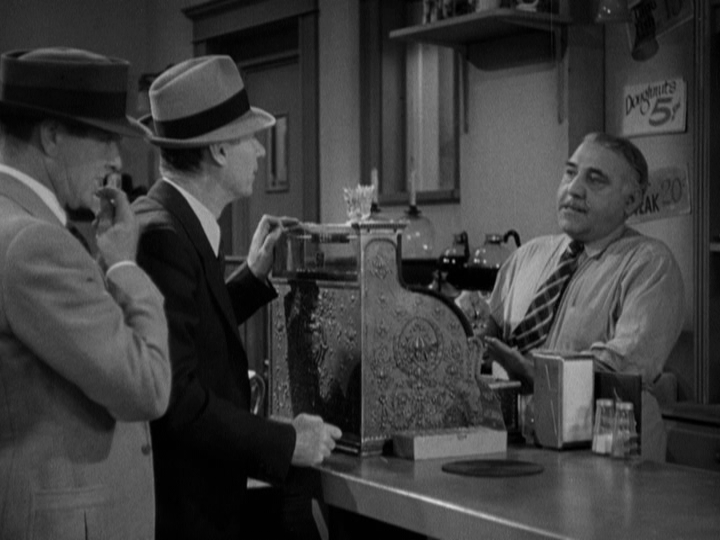| Description |
| On-screen: |
Joe and Mabel in Nick's Diner |
| Description: |
The cashier (Nick) starts singing "My Wild Irish Rose," accompanied by an invisible orchestra (probably a radio playing), which continues playing the tune after he stops singing the first phrase; the score simulates music heard on the radio |
| Music annotations: |
[m. 1] cue: X X X / allegro / mf / f / in one / My wild Irish rose - the sweetest flower that grows / (a little figuration maybe); [m. 3] cash register (on track); [m. 8] 8va ad lib (if you want) / f / (rather full); [m. 9] (rather full); [m. 30] rall; [m. 33] dolce; [m. 47] rall; [m. 49] a tempo; [m. 63] rall; [m. 65] a tempo; [m. 78] arp; [m. 79] rall |
| Film annotations: |
[m. 1] Radio Orchestra; [m. 8] Voice out; [m. 20] Check on table; [m. 24] Joe picks it up; [m. 33] Both rise; [m. 43] Joe puts cheque on counter; [m. 49] I met you smart boys; [m. 61] Why should I toss with you?; [m. 69] Suppose I tell you; [m. 71] Work it out; [m. 85] He leads Mabel to kitchen |
| Orchestration annotations: |
[m. 8] the orchestra: 3 saxes piano etc (like a large dance band); [m. 33] W.W.; [m. 64] div |
| Analysis: |
Steiner indicates that he wants the cash register to ring on beat four after the opening phrase; in the sketch, Steiner writes "by Olcott and Steiner" - Chauncey Olcott was an Irish tenor who sang this song; the form of the song is ABA, with a parallel double period in the A part |
|
| Tags |
accompanied source music | altered dominant | common-chord modulation | diner | establish character | familiar tune | friend | happy | leading lady | leading man | mode mixture | parallel double period | popular song | radio | shopkeeper | singing | source music | ternary form
|
Media |
